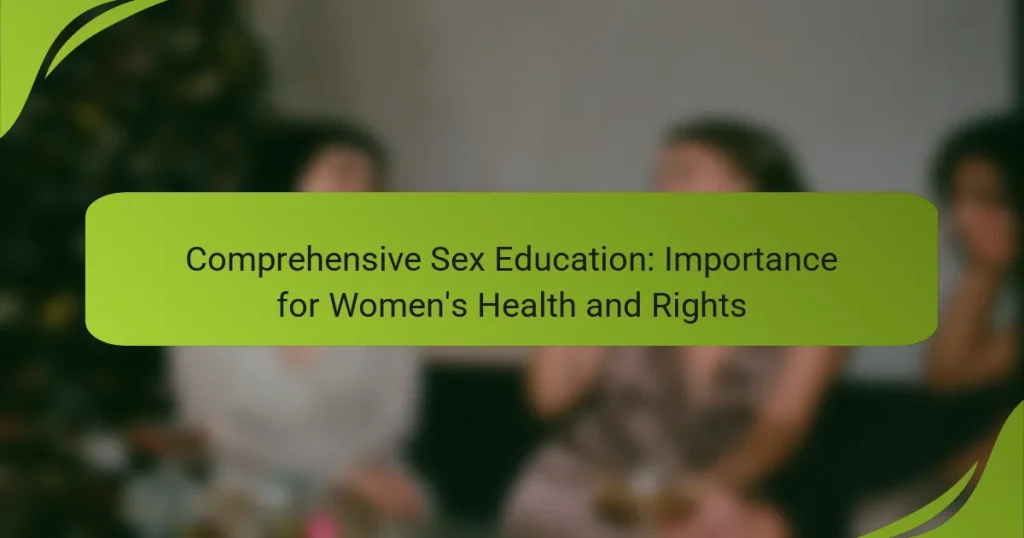Comprehensive sex education is vital for women’s health and rights, as it provides essential knowledge about reproductive health, safe practices, and personal empowerment. By fostering informed decision-making, it not only enhances individual health outcomes but also promotes gender equality and supports women’s rights within communities. Effective programs must be inclusive and evidence-based, engaging parents and communities to address the diverse needs of all students.
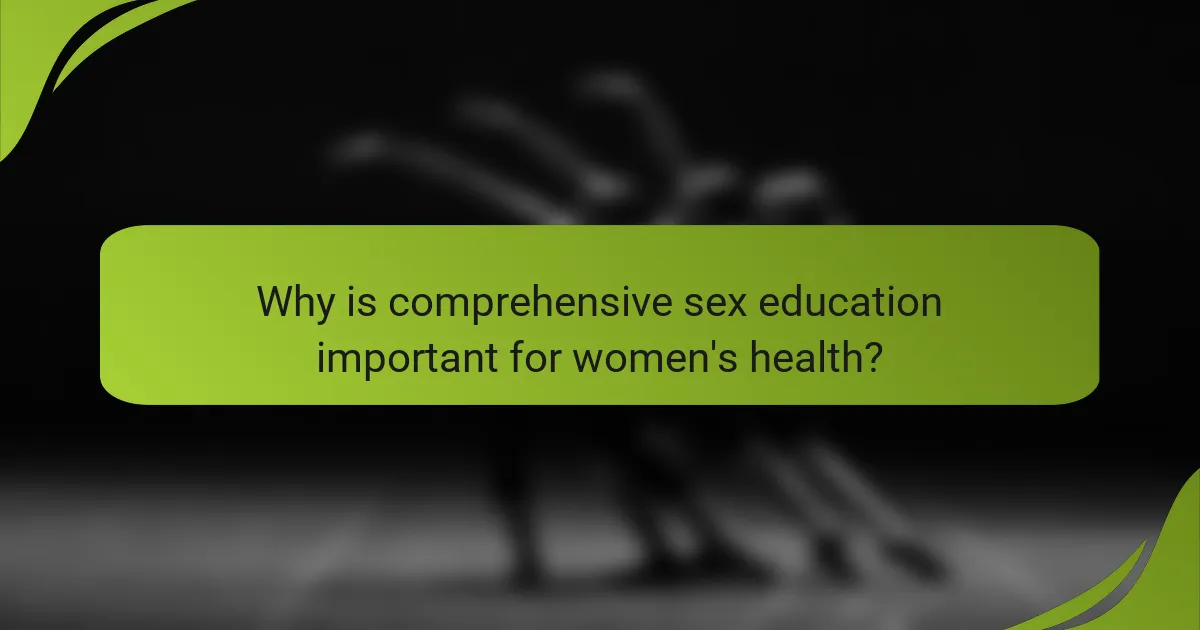
Why is comprehensive sex education important for women’s health?
Comprehensive sex education is crucial for women’s health as it equips them with essential knowledge about their bodies, reproductive rights, and safe practices. This education fosters informed decision-making, ultimately leading to better health outcomes and empowerment.
Promotes informed health choices
Comprehensive sex education provides women with the information necessary to make informed health choices regarding their sexual and reproductive health. By understanding topics such as consent, contraception, and sexually transmitted infections (STIs), women can navigate their health more effectively.
For instance, knowing the various contraceptive methods available allows women to select options that best suit their lifestyles and health needs. This knowledge reduces reliance on misinformation and promotes healthier choices.
Reduces rates of STIs and unintended pregnancies
Access to comprehensive sex education has been shown to lower the rates of STIs and unintended pregnancies among women. By learning about safe sex practices, including the use of condoms and regular health check-ups, women can significantly reduce their risk of infections and unintended outcomes.
Programs that include practical demonstrations and discussions about contraception can lead to a more than 30% decrease in unintended pregnancies in some communities. This highlights the importance of education in fostering safer sexual behaviors.
Empowers women through knowledge
Knowledge gained from comprehensive sex education empowers women by giving them the tools to advocate for their health and rights. Understanding their reproductive health enables women to make choices that align with their personal values and circumstances.
Moreover, education fosters confidence in discussing sexual health with partners and healthcare providers. This empowerment can lead to stronger relationships and improved health outcomes, as women feel more equipped to seek the care they need.
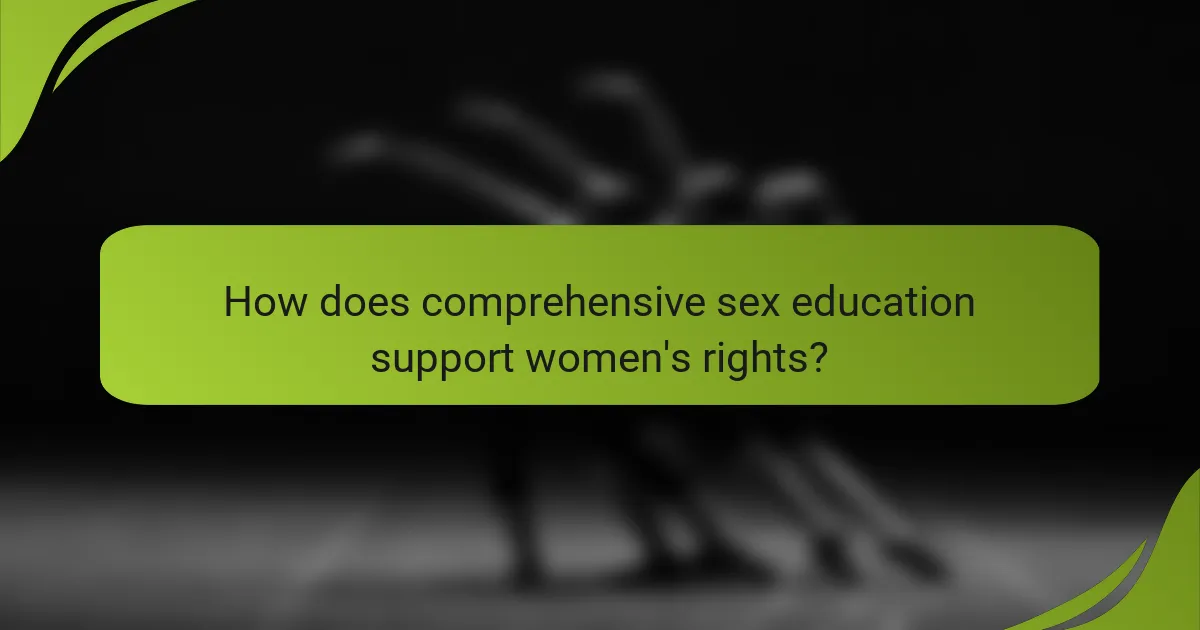
How does comprehensive sex education support women’s rights?
Comprehensive sex education is essential for supporting women’s rights by providing them with the knowledge and skills necessary to make informed decisions about their bodies and health. It empowers women to understand their rights and promotes gender equality, ultimately leading to healthier communities.
Fosters gender equality
Comprehensive sex education plays a crucial role in fostering gender equality by challenging stereotypes and promoting respect between genders. By educating both boys and girls about consent, relationships, and mutual respect, it helps dismantle harmful norms that perpetuate inequality.
Programs that include discussions on gender roles and power dynamics encourage young people to advocate for equal treatment and challenge discriminatory practices. This foundational knowledge can lead to more equitable relationships and a reduction in gender-based violence.
Encourages autonomy over reproductive choices
Comprehensive sex education empowers women to take control of their reproductive choices by providing accurate information about contraception, pregnancy, and sexually transmitted infections. Understanding these topics enables women to make informed decisions that align with their personal and health goals.
Access to this education is vital, as it can reduce unintended pregnancies and improve overall reproductive health. Women who are informed about their options are more likely to seek appropriate healthcare services and advocate for their own needs, leading to better health outcomes.
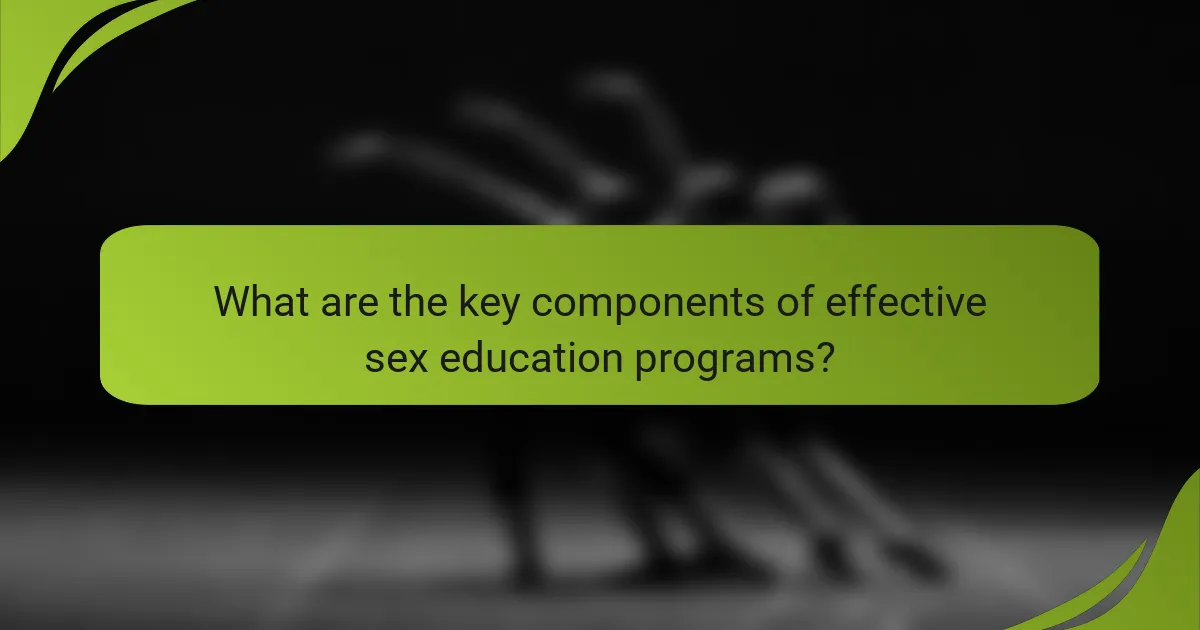
What are the key components of effective sex education programs?
Effective sex education programs include a comprehensive approach that addresses various aspects of sexual health, rights, and relationships. These programs should be inclusive, evidence-based, and actively involve parents and the community to ensure they meet the needs of all students.
Inclusive curriculum addressing diverse needs
An inclusive curriculum is essential for effective sex education, as it recognizes and addresses the diverse backgrounds, identities, and experiences of students. This includes content that is relevant to different sexual orientations, gender identities, and cultural contexts.
For example, programs should incorporate discussions about consent, healthy relationships, and the unique challenges faced by marginalized groups. This ensures that all students feel represented and supported in their learning.
Evidence-based teaching methods
Using evidence-based teaching methods is crucial for delivering effective sex education. These methods rely on research and proven strategies to engage students and enhance their understanding of sexual health topics.
Interactive activities, role-playing scenarios, and discussions based on real-life situations can help students apply what they learn. Programs should also be regularly evaluated and updated based on new research findings to maintain relevance and effectiveness.
Parental and community involvement
Engaging parents and the community in sex education programs fosters a supportive environment for students. When parents are informed and involved, they can reinforce the lessons learned at school and address any questions their children may have.
Community partnerships can also enhance resources and support for these programs. Schools should consider hosting workshops or informational sessions for parents to discuss the curriculum and its importance, ensuring everyone is on the same page regarding sexual health education.
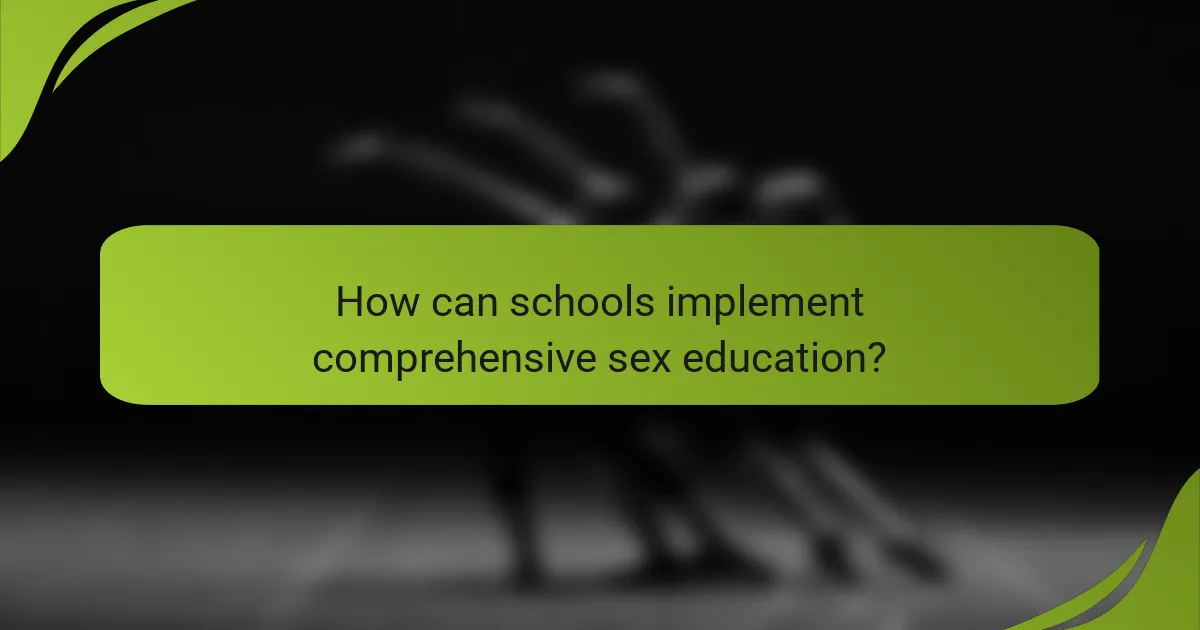
How can schools implement comprehensive sex education?
Schools can implement comprehensive sex education by integrating structured curricula that cover a range of topics related to sexual health, relationships, and consent. This approach ensures that students receive accurate information and develop the skills necessary for making informed decisions about their health and rights.
Training for educators
Training for educators is essential to effectively deliver comprehensive sex education. Teachers should receive professional development that covers not only the content but also pedagogical strategies for engaging students in discussions about sensitive topics. This training can include workshops, online courses, and resources that focus on inclusivity and cultural competence.
Additionally, ongoing support and mentorship can help educators feel more confident in their ability to address questions and concerns from students. Schools should consider establishing peer networks where teachers can share best practices and resources.
Partnerships with health organizations
Forming partnerships with local health organizations can enhance the quality of sex education programs in schools. These organizations can provide expertise, resources, and access to health professionals who can deliver workshops or presentations on specific topics such as contraception, sexually transmitted infections, and healthy relationships.
Schools should seek collaborations that allow for guest speakers, interactive sessions, and even health fairs that promote awareness and access to services. Such partnerships can also facilitate referrals for students needing further support or counseling.
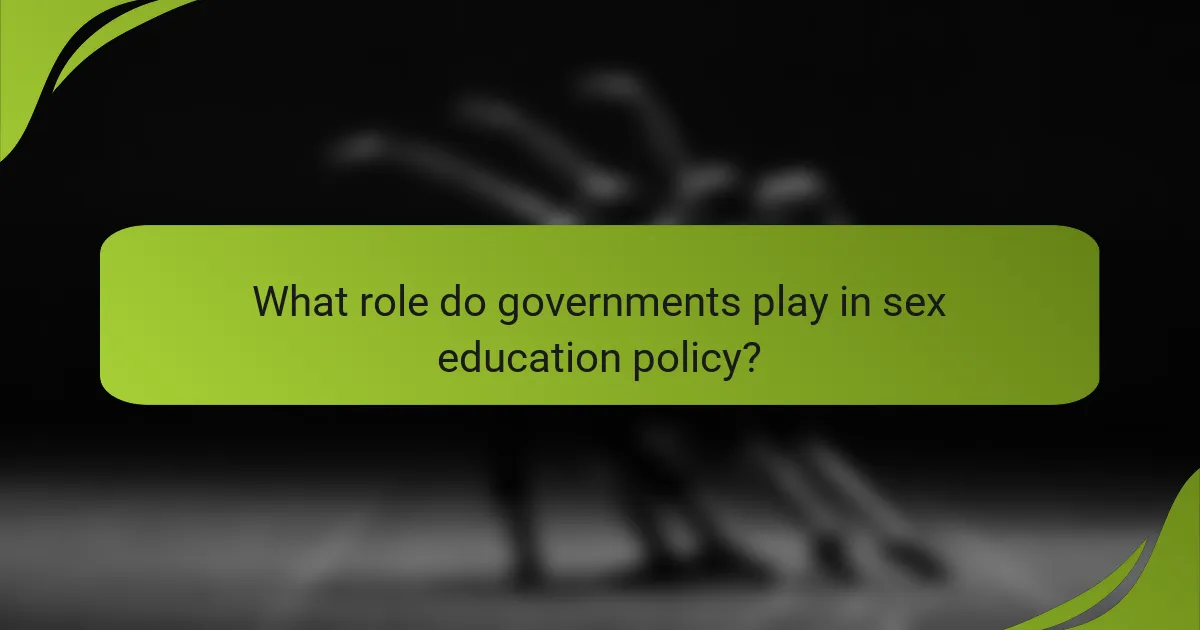
What role do governments play in sex education policy?
Governments play a crucial role in shaping sex education policy by establishing guidelines, funding programs, and ensuring that educational content is comprehensive and inclusive. Effective policies can lead to improved health outcomes and empower individuals with the knowledge to make informed decisions about their sexual health.
Legislation supporting comprehensive programs
Legislation is essential for the implementation of comprehensive sex education programs. Governments can enact laws that mandate age-appropriate, evidence-based curricula in schools, ensuring that all students receive consistent and accurate information. For example, some countries have laws that require schools to teach topics such as consent, reproductive health, and gender equality.
Additionally, legislation can promote inclusivity by addressing the needs of diverse populations, including [censured] youth. By incorporating these perspectives, comprehensive programs can foster a more supportive environment for all students.
Funding for educational resources
Funding is a critical component of effective sex education policy. Governments can allocate budgetary resources to develop and distribute educational materials, train educators, and support community outreach programs. This financial backing ensures that schools have access to high-quality resources that reflect current research and best practices.
Moreover, targeted funding can help address disparities in access to sex education, particularly in underserved communities. By investing in these areas, governments can promote equitable access to vital information that supports women’s health and rights.

What challenges exist in delivering sex education?
Delivering sex education faces several challenges that can hinder its effectiveness and accessibility. Key obstacles include cultural and religious opposition, as well as a lack of trained educators in the field.
Cultural and religious opposition
Cultural and religious beliefs often shape attitudes towards sex education, leading to significant resistance in many communities. Some groups may view comprehensive sex education as contrary to their values, advocating instead for abstinence-only programs that limit information on contraception and sexual health.
This opposition can result in policies that restrict the content of sex education in schools, leaving students without essential knowledge about their bodies, relationships, and safe practices. Engaging community leaders and fostering dialogue can help bridge these gaps and promote a more inclusive approach.
Lack of trained educators
A shortage of trained educators is a critical barrier to effective sex education. Many teachers may lack the necessary training or confidence to deliver comprehensive lessons, leading to inconsistent or incomplete information being provided to students.
Investing in professional development and resources for educators is essential. Schools and organizations can implement training programs that equip teachers with the knowledge and skills to address diverse topics, including consent, reproductive health, and [censured] issues, ensuring that all students receive accurate and relevant information.
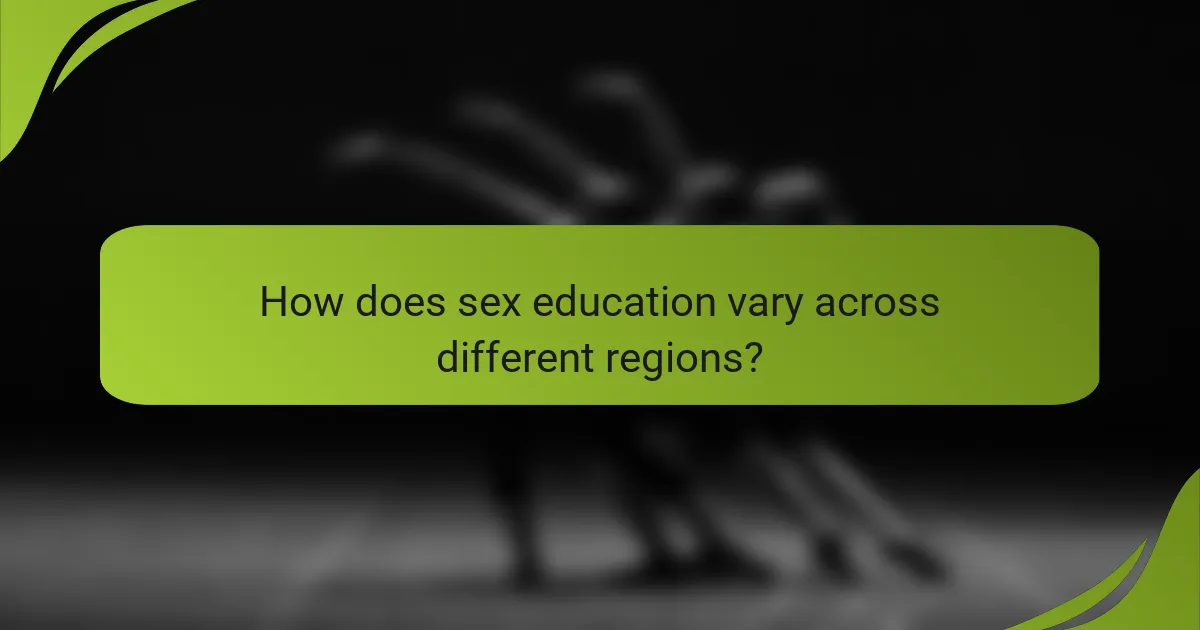
How does sex education vary across different regions?
Sex education varies significantly across regions due to cultural, legal, and educational differences. Some areas prioritize comprehensive programs, while others may provide limited or no formal education on sexual health and rights.
Differences in curriculum standards
Curriculum standards for sex education differ widely, often influenced by local laws and cultural attitudes. In some countries, such as the Netherlands and Sweden, comprehensive sex education is mandated, covering topics like consent, relationships, and reproductive health. In contrast, regions like parts of the United States may have abstinence-only programs, which often lack comprehensive information.
These varying standards can lead to significant disparities in knowledge and attitudes towards sexual health. For example, students in areas with comprehensive curricula tend to have better understanding of safe sex practices compared to those in regions with restrictive education.
Variability in access to resources
Access to resources for sex education can be inconsistent, affecting the quality of information available to students. In urban areas, schools may have better access to trained educators and materials, while rural regions might face shortages. This discrepancy can lead to gaps in knowledge and resources, impacting young people’s health decisions.
Additionally, online resources and community programs can supplement formal education, but their availability varies. In some countries, organizations may provide workshops and materials, while in others, such resources may be limited or stigmatized, hindering effective education.

What are the long-term benefits of comprehensive sex education?
Comprehensive sex education provides numerous long-term benefits for individuals and society, including improved health outcomes and enhanced rights for women. It equips individuals with the knowledge and skills to make informed decisions about their sexual health, leading to healthier relationships and reduced rates of sexually transmitted infections (STIs) and unintended pregnancies.
Improved sexual health outcomes
Comprehensive sex education promotes better sexual health by teaching individuals about safe practices, consent, and healthy relationships. This education can lead to a significant decrease in STIs and unintended pregnancies, as individuals are more likely to use protection and engage in responsible behaviors.
For instance, studies indicate that regions with comprehensive sex education programs often report lower rates of adolescent pregnancies compared to those with abstinence-only programs. This highlights the effectiveness of informed decision-making in promoting sexual health.
Empowerment and rights awareness
Comprehensive sex education empowers individuals, particularly women, by providing them with knowledge about their rights regarding sexual health and reproduction. Understanding these rights fosters confidence and encourages individuals to advocate for themselves in healthcare settings and relationships.
Empowered individuals are more likely to seek necessary healthcare services, understand consent, and engage in discussions about their sexual health. This awareness contributes to a culture of respect and equality, which is essential for women’s rights.
Reduction of stigma and discrimination
By addressing topics such as sexual orientation, gender identity, and reproductive rights, comprehensive sex education helps reduce stigma and discrimination. This inclusive approach fosters a more accepting environment for all individuals, regardless of their background or identity.
For example, inclusive sex education can lead to greater acceptance of [censured] individuals, reducing bullying and discrimination in schools. This not only benefits those directly affected but also promotes a healthier, more supportive community overall.
Long-term societal benefits
The societal benefits of comprehensive sex education extend beyond individual health outcomes. Educated individuals contribute to healthier communities, lower healthcare costs, and improved economic stability. When people are informed about their sexual health, they are more likely to make choices that benefit society as a whole.
Furthermore, comprehensive sex education can lead to a more informed electorate, as individuals who understand their rights are more likely to engage in civic activities and advocate for policies that support public health and education initiatives.
